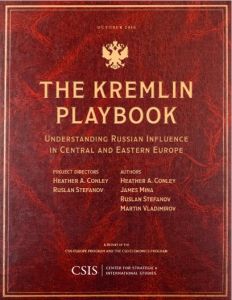Join getAbstract to access the summary!

Join getAbstract to access the summary!
Heather A. Conley
The Kremlin Playbook
Understanding Russian Influence in Central and Eastern Europe
CSIS, 2016
What's inside?
Russia has embarked upon a sophisticated campaign to sabotage democratic institutions.
Recommendation
Only recently have Western Europe and America begun to recognize Russian attempts to undermine democratic institutions and the Euro-Atlantic alliance. Central and Eastern European states, by contrast, have for many years now lived with and, to various degrees, fallen victim to Russian president Vladimir Putin’s efforts to bend them toward his interests. According to The Kremlin Playbook, the result of a 16-month study jointly conducted by the Center for Strategic and International Studies and the Bulgarian Center for the Study of Democracy, Russia exploited the 2008 global recession and its aftermath to increase its regional influence. Knowing Russia’s intentions and tactics goes a long way toward inoculating open, democratic societies against attempted Russian state capture. The Kremlin Playbook includes five case studies of Russian interference in Hungary, Slovakia, Bulgaria, Latvia and Serbia, which provide a starting point for learning how best to respond to this security challenge.
Summary
About the Author
Heather A. Conley and James Mina are Europe and Eurasia scholars at the Center for Strategic and International Studies. Ruslan Stefanov is the director of the economics program and Martin Vladimirov is an analyst at the Center for the Study of Democracy.

















Comment on this summary